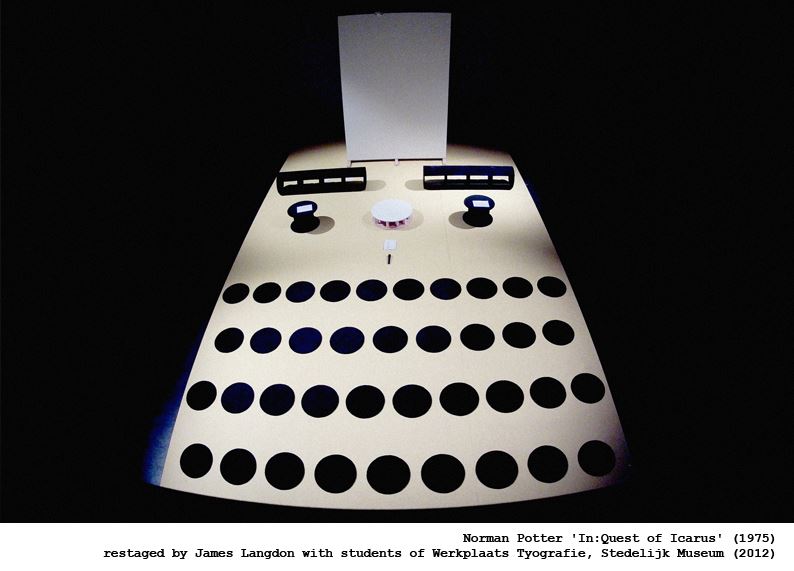
Thursday 8 May 5 – 7,30 PM at Konstfack (Mandelgrensalen)
The sixth Organising Discourse lecture starts to explore various aspects of publishing as forms of discursive space.
British graphic designer James Langdon will discuss formats in relation to design methods and decision-making. Swedish publisher and editor Staffan Lundgren will speak about the relation between publishing as a practice and criticality in design.
JAMES LANGDON:
FORMATS
Formats seem to exert two contrary forces in my practice: First, the potential of ‘appropriate’ format. A display format as a device to organise material to be represented. Second, format as a conditioning influence. Formats as programmes, limiting effects of formats.
In the presentation I will draw on examples in my practice and its frame of reference. The emphasis will be on demonstrating and manipulating tensions between format and narrative in design. This will include a visual typology of applications of the codex format, and my recent restaging of English designer and teacher Norman Potter’s isomorphic play In:Quest of Icarus.
The performance is staged on a model of the typewriter which composed it. The construction and performance are undertaken by design students. The play was performed only once during Potter’s life, by his students at the Construction School, Bristol, on 5 December, 1974. The two recent performances were produced by James Langdon with students from Werkplaats Typografie, Arnhem; and University of the West of England, Bristol.
STAFFAN LUNDGREN:
THE DEFUNCT DEMOCRACY OF DESIGN
“[S]o some of us is putting our social consciences to work. We believe, for social, political, religious reasons, that these things should be done. On the other hand, it is not too difficult to see that […] the motivation of professionals to stir up the populace into participatory action has been a way of finding allies for our own private inter-professional guerilla wars.”
Reyner Banham – in his opening address to the 1971 “Design Participation” conference at Owens Park, Manchester University.
In reflecting on the aim of Organising Discourse to ”support and invigorate the development of new conceptual and physical spaces for presentation and display, meetings, discussions and debate, research and modes of production, etc.” in general and its focus on “critical practice” in particular the notion of critique stands out. Not by means of its presence however but rather the opposite.
Notions of critical practice and its supposed possibilities is an oft called for trope in the designing disciplines based on the understanding of designs possibility to act as an agent of social and political change. In a time simultaneously defined by the void of self-critique and the omnipresent ideo-logic of late capitalism several strands of supposedly covert undertakings has proven themselves a failure. A failure that, I would like to suggest, is partly grounded in what architectural (and design) historian Manfredo Tafuri once referred to as “anachronistic ‘hopes in design’”.
In addition to, and as part of, the ideological “hopes of design” an important factor of the failures at hand lays in an epistemological and ontological turn away from the agency of the subject and its capacity of judgment and responsibility in favour of a turn towards material conditions as the basis for a critical practice expressed through, for example, the will to organise discourse by means of “physical spaces for presentation and display”, be this in the form of institutions or books. A question of outmost importance hence arises: is at all possible to democratise (by) design?
JAMES LANGDON is an independent designer and one of six founding directors of the artist-run gallery eastside projects in Birmingham, UK. He is director of the itinerant school for design fiction. In 2012 he was the recipient of the inform award for conceptual design, presented by the museum of contemporary art Leipzig, Germany. www.jameslangdon.net
STAFFAN LUNDGREN is founder and publisher of Axl Books, a member of the editorial board of Site, and currently conducting research on the ideo-logic of cybernetics at Chalmers School of Architecture and KTH School of Architecture. www.axlbooks.com